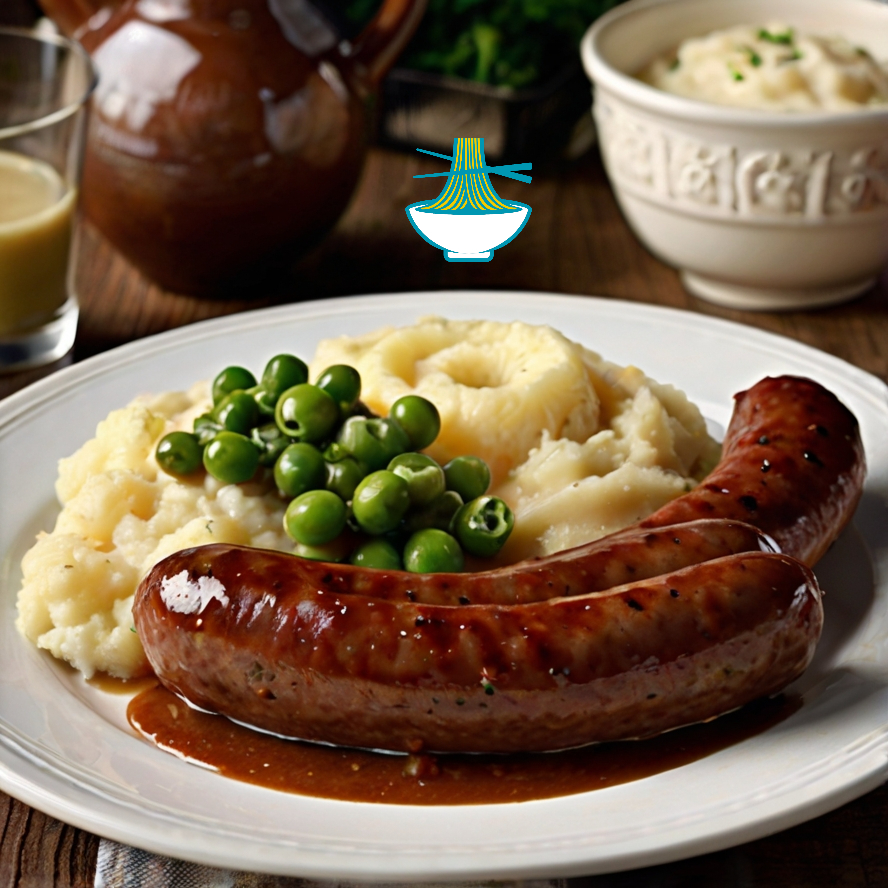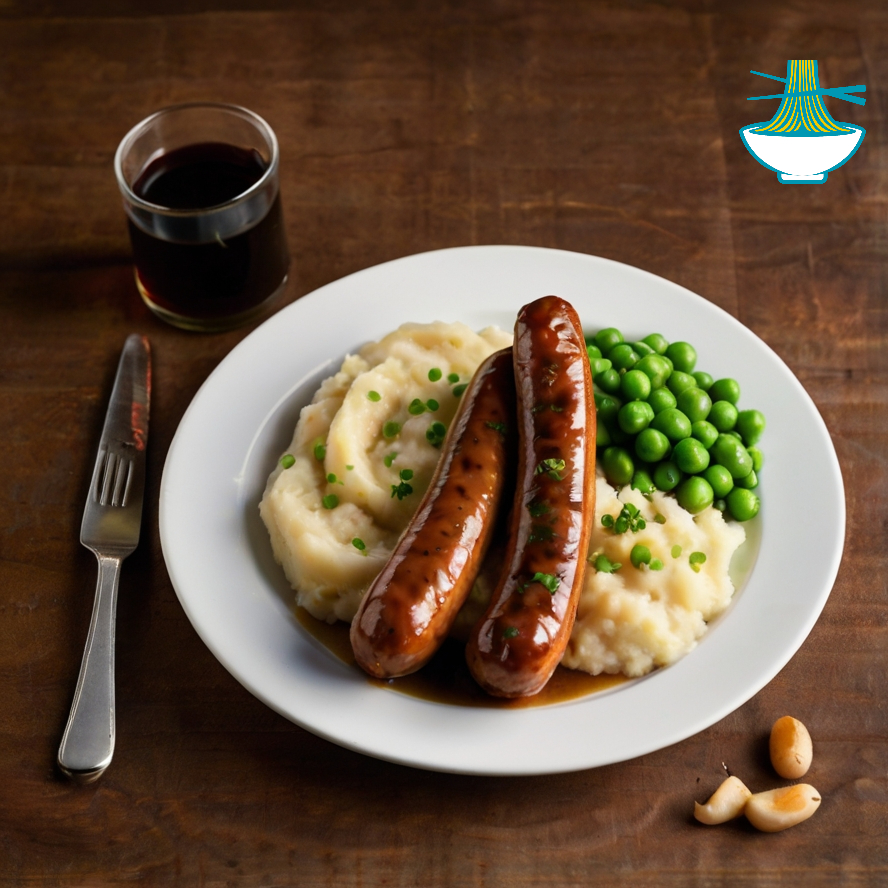Bangers and Mash, a comforting dish popular in the United Kingdom, is not only a treat for the taste buds but also offers a variety of nutrients. The sausages, often made from pork or beef, provide a good source of protein and essential vitamins like B12, which is important for energy production and maintaining a healthy nervous system. The mashed potatoes, made from starchy potatoes, offer a rich source of carbohydrates, which provide the body with much-needed energy. Additionally, mashed potatoes contain vitamin C, which supports immune function. When paired with peas, which are rich in fiber, protein, and vitamins like vitamin K, the dish becomes more well-rounded. Although delicious, it’s important to enjoy Bangers and Mash in moderation, as sausages can be high in saturated fats and sodium. Nonetheless, this classic meal offers a comforting balance of macronutrients, making it a hearty choice for a satisfying meal.
Ingredients:
- 4 sausages (pork, beef, or vegetarian alternative)
- 4 medium-sized potatoes
- 1/4 cup milk
- 2 tbsp butter
- Salt and pepper to taste
- 1/2 cup frozen peas (optional)
- 1/2 cup brown gravy (optional)
Preparation:
- Boil the Potatoes: Start by peeling and chopping the potatoes into even chunks. Place them in a large pot and cover them with salted water. Bring the water to a boil and cook the potatoes for about 15 minutes, or until they are tender when pierced with a fork. Drain the potatoes in a colander and set them aside.
- Cook the Sausages: While the potatoes are boiling, heat a large frying pan over medium heat. Add the sausages to the pan and cook them, turning occasionally, for about 10-12 minutes. Ensure the sausages are golden brown on the outside and fully cooked through on the inside. If necessary, cut one open to check for doneness.
- Mash the Potatoes: Once the potatoes are tender and drained, return them to the pot or a large mixing bowl. Mash the potatoes with a potato masher until smooth and creamy. Add butter and milk to your desired creaminess, then season with salt and pepper to taste.
- Prepare the Peas: While mashing the potatoes, heat the peas in a small pot over low heat or in the microwave for 1-2 minutes, until they are warmed through. Stir occasionally to ensure even heating.
- Assemble the Dish: Spoon the mashed potatoes onto plates and top with the cooked sausages. If using, pour a generous amount of brown gravy over the sausages and mashed potatoes. Serve the peas on the side for a complete meal.
- Serve and Enjoy: Your traditional British Bangers and Mash is ready to enjoy! Serve immediately for a hearty, comforting meal.
Healthier Recipe Modifications:
Can these modifications make the dish more suitable for specific dietary preferences?
To make Bangers and Mash healthier, consider the following adjustments:
- Sweet Potato Instead of Regular Potatoes: Sweet potatoes are rich in vitamins, particularly vitamin A, and have a lower glycemic index compared to regular potatoes. They are a healthier alternative, especially for those aiming to manage their blood sugar levels.
- Vegetarian or Leaner Sausages: You can swap out traditional pork or beef sausages for vegetarian sausages made from ingredients like lentils, beans, or peas. Alternatively, choose leaner meats, such as chicken sausages or sausages made with turkey, to reduce the saturated fat content in the dish.
Tips to Reduce Fat and Sodium:
How can I make Bangers and Mash healthier for me and my family?
Since sausages are often high in saturated fat and sodium, here are some tips to make the dish healthier:
- Choose Lower-Fat Sausages: Look for sausages labeled as "low-fat" or "reduced-fat" to decrease the fat content. Alternatively, turkey or chicken sausages are typically lower in fat than pork sausages.
- Skip the Gravy: Brown gravy is often high in sodium and fat. To avoid this, consider using a healthier homemade sauce, such as a tomato-based sauce or a homemade gravy made from low-sodium stock and thickened with cornstarch.
- Reduce the Butter in Mashed Potatoes: Instead of using a large amount of butter, use a small amount or substitute with olive oil or Greek yogurt for a creamier texture with less fat.
FAQs:
Can I substitute ingredients to make this dish healthier?
- Yes, as mentioned earlier, you can replace regular potatoes with sweet potatoes, swap traditional sausages for leaner or plant-based options, and use healthier alternatives to gravy, like tomato-based sauces.
What are the benefits of this dish for children or athletes?
- Bangers and Mash can be a great source of protein, essential vitamins, and carbohydrates, making it suitable for children who need energy for growth and development. For athletes, this dish can help replenish energy after exercise, especially when paired with peas for additional protein and fiber.
Can this dish be made healthier?
- Absolutely! As noted, substituting ingredients like using sweet potatoes for regular potatoes, reducing butter in the mashed potatoes, and opting for leaner or plant-based sausages can make the dish healthier. Additionally, using homemade low-sodium gravy or skipping it altogether will reduce fat and sodium content.
How can I serve Bangers and Mash with other dishes?
- This dish pairs well with various vegetables such as roasted Brussels sprouts, steamed broccoli, or a simple green salad. For a balanced meal, you can add more fiber-rich vegetables or a side of whole grains like brown rice or quinoa.
Is Bangers and Mash suitable for a vegetarian or gluten-free diet?
- Yes, by using plant-based sausages and ensuring that no gluten-containing ingredients are included (such as checking the gravy or sausages for gluten), this dish can be made suitable for both vegetarians and those following a gluten-free diet.

Nutritional Values and Benefits
Pork Sausages (4 sausages, 200g)
- Calories: 500
- Protein: 20g
- Fat: 40g
- Carbohydrates: 4g
- Sodium: 900mg
Nutritional Benefit: Sausages are a good source of protein and provide essential vitamins such as vitamin B12, which supports energy production. However, they can be high in saturated fats and sodium, so it's important to consume them in moderation.
Medium-Sized Potatoes (4 potatoes)
- Calories: 400
- Carbohydrates: 90g
- Protein: 8g
- Fat: 4g
- Fiber: 8g
Nutritional Benefit: Potatoes are an excellent source of carbohydrates, providing energy to the body. They also contain vitamin C, which supports immune function, and fiber, which aids in digestion.
Milk (1/4 cup)
- Calories: 30
- Protein: 2g
- Fat: 1.5g
- Carbohydrates: 3g
Nutritional Benefit: Milk is rich in calcium, which is essential for strong bones and teeth. It also provides protein, which supports muscle health, and vitamin D, which helps with calcium absorption.
Butter (2 tbsp)
- Calories: 200
- Fat: 22g
- Protein: 0g
- Carbohydrates: 0g
Nutritional Benefit: Butter is a source of fat, providing energy. It also contains small amounts of vitamins A and D, which support vision and bone health, respectively. However, it’s high in saturated fats, so it should be used in moderation.
Frozen Peas (1/2 cup)
- Calories: 60
- Carbohydrates: 10g
- Protein: 4g
- Fat: 0g
- Fiber: 4g
Nutritional Benefit: Peas are a great source of plant-based protein and fiber, promoting digestion and heart health. They also contain essential vitamins like vitamin K, which supports bone health, and vitamin C, which boosts the immune system.
Brown Gravy (1/2 cup)
- Calories: 60
- Carbohydrates: 10g
- Protein: 1g
- Fat: 3g
- Sodium: 400mg
Nutritional Benefit: Gravy adds flavor to the dish but is often high in sodium. While it contributes some calories, it’s best used in moderation to enhance the overall taste without overloading on sodium.
Environmental Impact of the Dish:
Can the environmental impact of Bangers and Mash be reduced?
- When considering the environmental impact of Bangers and Mash, it's important to reflect on the sustainability of the ingredients, particularly the meat used in the sausages. Both pork and beef production have significant environmental consequences. Livestock farming is responsible for greenhouse gas emissions, deforestation, and high water usage. Beef, in particular, has a larger carbon footprint than pork, as cattle require more resources to produce and contribute significantly to methane emissions.
Bangers and Mash is a comforting and fulfilling meal that offers a variety of nutrients, from protein and vitamins to fiber and healthy fats. When enjoyed in moderation, this classic British dish can provide a satisfying balance of macronutrients for a hearty and delicious meal.


Comments